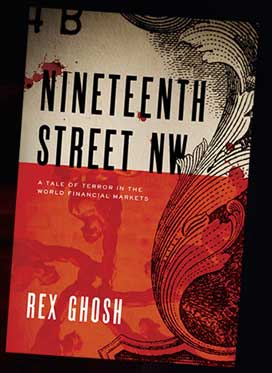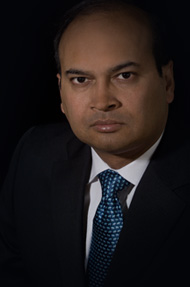


WASHINGTON — A mysterious hedge fund takes aim at weak currencies from Colombia to Ukraine. Finally, it succeeds in Turkey and a panic ensues as investors dump government debt, the currency dwindles and Ankara defaults on its obligations.
The scenario is fictitious, but its themes — avaricious traders, volatile currencies and beleaguered governments — seem to resonate in a world healing fitfully from the 2008 financial crisis. Greece, anyone?
 “Nineteenth Street NW,” by the I.M.F. economist Atish Rex Ghosh, is in its second printing.
“Nineteenth Street NW,” by the I.M.F. economist Atish Rex Ghosh, is in its second printing.That might explain why “Nineteenth Street NW,” a novel by a Harvard-trained economist at the International Monetary Fund, has attracted some interest, at least among the international banking set.
Paul A. Volcker, a former Federal Reserve chairman, said he liked the combination of “finance and intrigue.”
Simon Johnson, a former chief economist for the I.M.F., called the novel “a profound critique of the global economic system” that was “concealed within a gripping thriller.”
The novel’s author, Rex Ghosh, is chief of the systemic issues division at the I.M.F., which only three years ago seemed to be slipping into irrelevance, bruised by criticism of its response to the 1997-98 Asian financial crisis.
“A few years ago, the institution seemed moribund,” said Mr. Ghosh, 46, who has worked at the fund since 1994 and publishes his research under his full name, Atish R. Ghosh.
“When I was trying to shop the book around, originally in 2006, I could not get anyone interested. I remember a letter from a major publishing house saying, ‘It’s very nicely written, great characters, but the plot — a global financial crisis — is too implausible.’ ”
So Mr. Ghosh published the book in 2008 under a pen name, Brett Woods, a play on the Bretton Woods conference in 1944 that created the I.M.F.
Soon after, the world was plunged into a crisis that thrust the I.M.F. onto center stage and renewed its role as a financial monitor and firefighter.
Mr. Ghosh brought out a second edition last month with a new publisher, Greenleaf Book Group Press, in time for the annual meetings of the I.M.F. and the World Bank here, where he sold and signed scores of copies.
The book’s title refers to the street here that separates the two institutions.
Its plot centers on two economists: a cynical bureaucrat, Celine O’Rourke, and a morally conflicted terrorist, Sophia Gemaye, who infiltrates an I.M.F.-like institution to sabotage currency markets and draw attention to the plight of her homeland, an unnamed, oil-rich developing country.
The novel takes a skeptical view of economists, their lingo and their values. One character, a love interest of Sophia, is described as “slipping effortlessly into the usual economists’ euphemisms — from ‘fiscal retrenchment’ to ‘labor market flexibility’ — that disguise, even from the speaker, the unpleasantness of slashing budgets and throwing people out of work.”
Another character admits: “We try to do good, and sometimes we end up doing harm. We’re the surgeon whose patient dies in the operating theater. Or worse, we don’t even know if we did harm or whether things would’ve turned out even more disastrous without us.”
Yet Mr. Ghosh says he thinks the image of the I.M.F. as a heartless institution that cracks down on financially stricken nations is outdated. “The I.M.F. has been rehabilitating its reputation in emerging market countries, especially Asia, since the Asian crisis by acknowledging where we were wrong — but also, I think, drawing lessons about what we did right,” he said.
The book also seems to capture the rhythms — and tedium — of economic diplomacy, poking fun at the predictable communiqués from international financial gatherings: “Celine saw that it was just a rehash of the usual stuff — exhortations for greater international cooperation and coordination, admonitions for prudent monetary and fiscal policies — and the idea of trudging through the same trite, tired phrases, trotted out each year like forgotten medals at a Veterans Day parade, filled her with revulsion.”
The plot is not so far-fetched. The financier George Soros forced the British pound off the European exchange-rate mechanism in 1992, which was followed by similar devaluations in Sweden and Italy. Currencies from South Korea to Thailand were brought down by hedge fund attacks in 1997-98.
With central banks intervening again to prevent currency appreciation as the Federal Reserve prepares to inject even more dollars into the economy, “it might be that the zeitgeist favors this plot,” said Sebastian Mallaby, a fellow at the Council on Foreign Relations and himself an author of a nonfiction book on global financial wizardry: “More Money Than God: Hedge Funds and the Making of a New Elite,” published in June.

